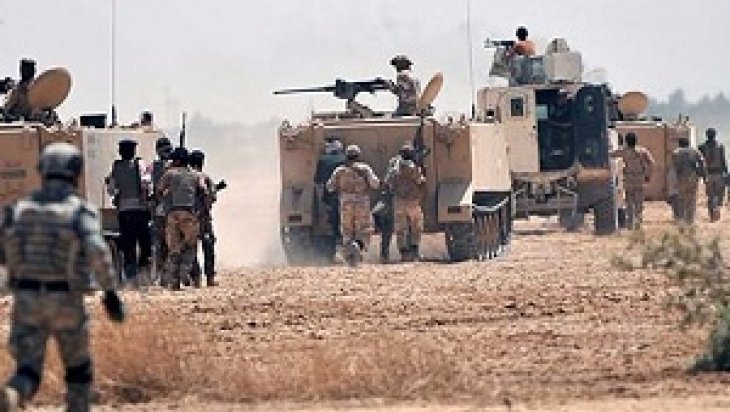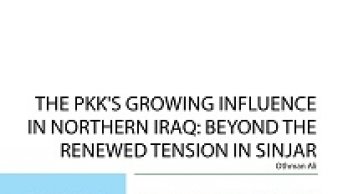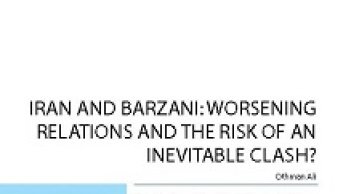Liberation of Mosul from ISIL Should not Lead to Its Destruction

There is urgent need for the people of Mosul to be liberated from Islamic State of Iraq and Levant (ISIL) and to put an end to their sufferings. Due to the significance of the city as the second largest urban center of Iraq, and its geo-political importance for Iraq and many regional countries, the liberation of Mosul will be like a final nail on the coffin of ISIL. The terror group will basically lose its momentum and will no longer be a magnet for foreign terrorist fighters. In addition, the fall of Mosul will have a devastating impact on ISIL militants defending their de facto capital in Raqqah in Syria.
Nevertheless, the liberation of Mosul should not lead to the destruction of the city. It would be valid to argue that all indications point to the desire of the central government, the Shiite commanders in the army, federal police, and al-Hashd al-Shaabi militias to achieve the expulsion of ISIL at the earliest possible time and at all costs. This phase would probably be followed by large scale retribution against Mosul and its inhabitants for supposedly sheltering fighters of the ISIL.
Besides, Shiite leaders contend that during Saddam Hussein’s regime, the city was widely known for producing top Baathist military officers and Iraq’s fearsome intelligence and security apparatus. After the U.S. disbanded the Iraqi Army and banned the Baath Party, it became famous for producing hundreds of insurgents. Iraq’s Prime Minister at the time of the American withdrawal, in 2011, was Nuri al-Maliki, a Shiite Muslim with close ties to Iran, who purged Iraq’s security forces of Sunni officers and gave way to a Shiite hegemony in the government. For the Mosul administration, al- Maliki dispatched Shiite soldiers and police whom many former residents have viewed as sectarian.
One has to take into account the fact that most of units in the Iraqi army, Federal Police, and anti-terrorism units, which are currently carrying out the fighting in Mosul, are predominantly Shiites. Sunni Arabs and Kurdish officers have been excluded to a great extent. Besides, the Iraqi parliament, which has been argued to be acting as a simple rubber stamp for the Shiite-dominated government, consistently refused to ratify the National Guard Law proposal. This proposal would have enabled the people of Mosul, and other Sunni provinces, to raise a local police force to defend themselves against al-Qaeda and subsequently ISIL. In addition, the Shiite National Alliance leaders have done their best to block Atheel Nujaifi, ex-governor of Mosul, from raising a formidable local force to stand against ISIL. The latter was accused of being sold out to Turkey and even he was put on trial. With the help of the Kurdistan Regional Government (KRG) and Turkey, Mr. Nujaifi has managed to raise a force from Mosul called Hashd al- Watani. However, this force is a small one and not well-equipped to play a leading role in the ongoing battle. If this force was allowed to have sufficient power, it would have been very useful especially regarding the urban warfare aspect of the Mosul operation. The members of the Iraqi army units who have taken part in the operation so far are mostly from the south and not familiar with the city, which puts them into a disadvanteous position against the ISIL fighters who have a good knowledge of the city. ISIL has been ruling for two years in Mosul. Besides, had the local militias been raised beforehand, the task of resistance to and expulsion of ISIL would have already been given to the people of Mosul.
During the last two years, ISIL has alienated all the segments of the population of Mosul, especially the inhabitants of the city. Mosul has never been a bastion for militant Salafism. It has been a stronghold of the Islamic Party which has Ikhwani roots. There are strong Sufi centers in the city, too. The people of Mosul have strong attachment to numerous historical and sacred saints and piousmen, whose shrines had been destroyed by ISIL. Furthermore, most ex-Baathist officers of the Iraqi army were not sympathetic to ISIL at all, which had executed hundreds of them. ISIL is largely a rural-based phenomena and alien to Mosul. In fact, most of ISIL’s fighters and high cadres in Mosul are foreign terrorist fighters.
Therefore, it can be argued that the population of Mosul and their resentment against ISIL provides a great social potential against ISIL which could have been turned into an effective military force, if trained and equipped properly. Had this anti-ISIL potential been utilized, we would not have needed all these US-led allied fire power, which is currently destroying most of the city’s infrastructure to force ISIL out of the town. It is noteworthy that the US-led forces had already destroyed all of the five bridges on Tigris River, which connect the two banks of the river “US-Led Alliance’s Jets Destroy Last Bridge Connecting Eastern, Western Mosul.”
Even though close to two months have already passed, Iraqi forces have taken back only 20% of the eastern side of the city so far. Commanders of the Iraqi army want the government to encourage residents of Mosul to leave the city, so that they will be free to use heavy artillery and air power against the city. This would eventually force ISIL fighters out, but most of the city will lie in ruin and such a military option would force almost one million people to live under unbearable conditions as refugees. In such a scenario, the destructive process of the so-called “liberation” of Ramadi, Fallujah, and Tikrit is likely to be repeated here. As Dylan O’Driscoll from Middle East Research Institute eloquently writes: Liberating people only for them to a) have insufficient shelter or food, b) suffer abuses and revenge from the liberating forces, c) return to a destroyed city with no immediate plan for reconstruction, d) be politically marginalized, and e) return to political chaos, vigilantism and inter-ethnic/sectarian conflict will do nothing to achieve the goal of actually defeating ISIL. Liberating people under this circumstance will only make them question whether they were better off under ISIL.
There are also concerns that some circles in Iraq and Iran want to see the two Sunni metropolitan centers, namely Mosul and Aleppo, to be destroyed due to their historical significance for the Arabs. Eyad Abu Shakra of Asharq Al-Awsat draws interesting similarities between what is happening in Aleppo and Mosul.
For these reasons, it is warranted to argue that the liberation of Mosul could have been achieved without the colossal damages, which are currently being inflicted on the city and its population, had the government of Haider al-Abadi fulfilled his promises to empower Sunni Arabs, especially those who live in Mosul. The Mosul operation, which is being carried out by the Iraqi army, has an agenda which goes beyond the mere expulsion of ISIL from the city to contribute to the hegemonic policies of Iran and building a new political structure in Iraq, which risks the exclusion of Sunnis both Arabs and Kurds. Such a scenario could mean the destruction of Mosul as the people of the region have known it for centuries.







